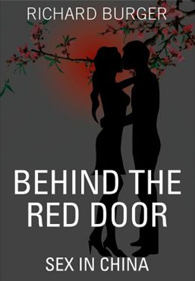
China View reports: "The Chinese history of homosexuality has undergone a dramatic trajectory. In contemporary China, homosexuality wasn't decriminalized until 1997. And in 2001, it was removed from being listed as a mental disease. But for centuries, China was more tolerant of same-sex love than nearly any other society, rivalled perhaps only by ancient Greece and Rome, according to Richard Burger, author of Behind the Red Door: Sex in China. However, he says the same-sex behavior in ancient China differs from the modern understanding of homosexuality."
Burger, a former editor at a state-run newspaper in Beijing, says in the video interview: “We really can't compare the homosexual activities of ancient China with what we see in the West today. Same sex love was everywhere. It's documented; there are books written about it. The Han emperor had a scribe who kept a book detailing the emperor's male lovers. In the West, homosexuality is what your identity is. It’s who you are. In China, men were heterosexual, most of them. They had their wives and their families; having sex with men was just something that they did. It was a sign of prestige. It was a very common practice there were brothels, whorehouses where the men could find boys to be with. This really exploded in Beijing toward the end of the Qing dynasty. That's when we brought in the Beijing opera and all these acting groups had lots of young boys and they would dress up in women's clothing. They would oil their skin and make their skin soft and they would be the boys for the wealthier man and government figures.
“It wasn't just about sex and it was a sign of prestige. The boy is always of a lower social class than the man who's paying for his services and it was seen as a sign of your wealth that you could be seen with one of these expensive boys.”
An excerpt from Richard Burger's 2012 interview with Danwei, a site that focuses on research and analysis of Chinese media and the Internet:
What was the pre-modern Chinese attitude to homosexuality?
Burger: If people are going to be startled by anything in the book I think it might be the section on homosexuality in imperial China. For centuries it was widely practiced, mainly by the literati and ruling classes, though there is plenty of evidence of same-sex love between ordinary Chinese, even in the countryside. As long as these men married and had children, it was acceptable for them to carry on affairs with men outside the home. Many emperors kept male lovers along with their harems of concubines. Han Dynasty scribes actually catalogued the emperors’ male lovers. Homosexuality was not an identity, it was something men simply did for entertainment, and often to display their class privilege. They were not “gay” — they were married men who carried on with men for amusement and pleasure. With the advent of the Beijing opera and the inflow of “song boys” who performed them, male same sex love soared in the late 19th century as many middle and upper-class men sought the company of these effeminate young boys, who always played the passive role and often dressed in female clothing. This didn’t come to an end completely until the early twentieth century.
When did homsexuality become a crime of hooliganism? When was this changed? How has life changed for gays and lesbians in China over the last two decades?
Burger: Early in Mao’s rule homosexuality was labeled both a psychological disorder and an act of hooliganism. Most gays at the time had no idea there were millions like them, and believed something was wrong with them. Men could only meet other men in parks and public toilets, where they risked arrest. Punishments varied in different parts of China. Some men were charged a fine, others put in jail, and often they were ostracized in their danwei, where they lived the rest of their lives in stigmatization.
It was only in 1997 that homosexuality was decriminalized and four years later it was removed from the official list of mental illnesses. Gay bars opened in the early 1990s and gays in urban areas became part of a community. The days of parks and toilets as the only option was over. Nevertheless, gays still succumb to the pressure to marry — more than 80 percent do so — and are forced to live a life of secrecy. This is tragic both for them and for their spouse, whose needs cannot be fulfilled.
To read more, click here.
